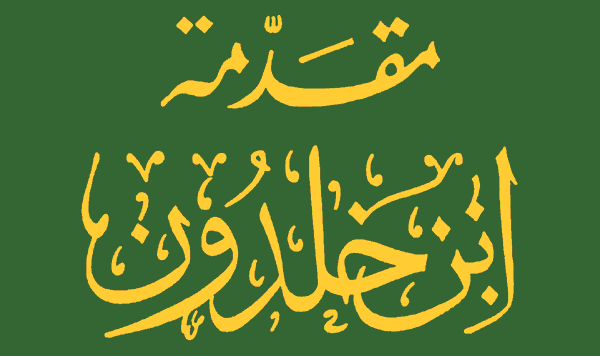

"Muqaddimah, Ibn Khaldun" in calligraphic form
Source: http://userpage.fu-berlin.de/~frers/ibn_khaldun.html
(downloaded Feb. 2007)
*A statue of Ibn Khaldun in Tunis*
Source: http://www.agonia.net/index.php/article/187624/index.html
(downloaded Feb. 2007)
Empires have Their Natural Term (from the Muqaddimah)
12 An empire, as we remarked, seldom outlives three generations. The first maintains its nomadic character, its rude and savage ways of life; inured to hardships, brave, fierce, and sharing renown with each other, the tribesmen preserve their solidarity in full vigor: their swords are kept sharp, their attack is feared, and their neighbors vanquished.
13 With the second generation comes a change. Possessing dominion and affluence, they turn from nomadic to settled life, and from hardship to ease and plenty. The authority, instead of being shared by all, is appropriated by one, while the rest, too spiritless to make an effort to regain it, abandon the glory of ambition for the shame of subjection. Their solidarity is weakened in some degree; yet one may notice that notwithstanding the indignity to which they submit, they retain much of what they have known and witnessed in the former generation—the feelings of fierceness and pride, the desire for honor, and the resolution to defend themselves and repulse their foes. These qualities they cannot lose entirely, though a part be gone. They hope to become again such men as their fathers were, or they fancy that the old virtues still survive amongst them.
14 In the third generation the wandering life and rough manners of the desert are forgotten, as though they had never been. At this stage men no longer take delight in glory and patriotism, since all have learned to bow under the might of a sovereign and are so addicted to luxurious pleasures that they have become a burden on the state; for they require protection like women and young boys. Their national spirit is wholly extinguished; they have no stomach for resistance, defense, or attack. Nevertheless they impose on the people by their bearing and uniform, their horsemanship, and the address with which they maneuver. It is but a false show: they are in general greater cowards than the most helpless women, and will give way at the first assault.
The monarch in those days must needs
rely on the bravery of others, enroll many of the freedmen, and recruit
soldiers capable, to some extent of guarding the empire, until God proclaims
the hour of its destruction and it falls with everything that it upholds.
Thus do empires age and decay in the course of three generations.
Source: Adapted from Prolegomena by Ibn Khaldun, translated in part by Reynold A. Nicholson in Translations of Eastern Poetry and Prose. Cambridge University Press, England, 1922. Adaptation and selection Copyright © Rex Pay 2000
Source: *http://www.humanistictexts.org/ibn_khaldun.htm*
(downloaded Feb. 2007)
== Indian Routes index == Indian Routes sitemap == Glossary == FWP's main page ==